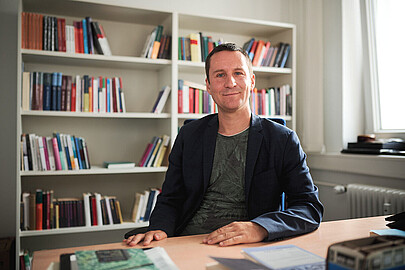

 ©
Sören Pinsdorf / LUH
©
Sören Pinsdorf / LUH
Freedom of speech enjoys particular protection in our liberal democratic order. However, in recent years different political actors and groups have increasingly used the right to free expression of opinion to loudly disseminate fake news, disinformation and alternative facts and to incite fear and spread hate. The uproar on all sides is making people feel more and more insecure. The mainstream of society is faltering, and democracy is becoming a risk.
Freedom of opinion in the age of fake news and populism
Please note that activating the video will result in the transfer of data to the respective provider. Further information can be found in our privacy policy.
Play video
To select English subtitles, use the settings button at the bottom right of the video screen.
The sociological diagnosis of “risk democracy” refers to key challenges in current-day society. In particular, it includes the erosion of three central basic institutions of the modern age: politics, the mass media and science.
Paradoxically, it is precisely the successes and increased importance of these areas of activity that have caused them to come under pressure for a number of years now. For example, democratisation processes have contributed to groups taking to the streets in the name of the people and freedom in order to do away with democracy. Similarly, academicising processes have led to academic laypeople using scientific scepticism about statements of fact to counter scientifically validated knowledge and its producers in order to invalidate politically undesirable facts. Finally, society’s extensive focus on media discourses has laid the foundation for the digital fragmentation of the public sphere, with professional media reports being reduced to “fake news” by lay journalists.
As a result of this triple destabilisation of modern institutions, a fickle and risky group has emerged at the so-called middle of society. It is confronting elites from politics, academia and the mass media with increasing mistrust.
Within the framework of various projects, Prof. Laux is currently particularly interested in the effects on the interaction between academia and society that emerge from this “risk democracy” constellation. What does the risk democracy mean for the production, communication and social adaptation of academic knowledge and the stability of the scientific system?
Participating researcher
At the Leibniz Center for Science and Society (LCSS), Prof. Dr. Henning Laux, professor of sociological theories of the knowledge society, interprets contemporary society as a “risk democracy” in which politics, academia and the mass media are increasingly coming under pressure. Based on this diagnosis, Prof. Laux studies the effects on the scientific system.


 ©
Sören Pinsdorf
©
Sören Pinsdorf
Contact person, Communications and Marketing
30167 Hannover










